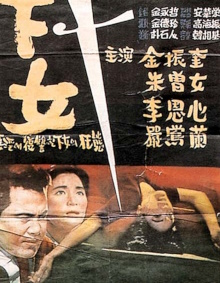This is apparently considered one of South Korea’s greatest films and is highly regarded internationally. Surely that’s a good enough reason to watch it, yet having done so I can’t see what’s so great about it at all. I think it’s melodrama, ramped all the way up to eleven and given a horror twist. There are some bold choices such as how deeply the children are involved in a drama involving adult themes. Yet I find myself unable to look past the deeply rooted misogyny at its heart and the predictable soap opera style drama in practically every one of its scenes. I hated it and it reminded me why I don’t watch Korean dramas in the first place.
Dong-sik Kim is a music teacher and pianist who works in a factory, providing extracurricular activity to its mainly female employees. Though married with two children, he is considered good looking by the women and has many admirers. When he receives a love letter from one of the staff, he reports it to the factory, resulting in the girl getting fired. At home, Kim’s wife works tirelessly as a seamstress and he himself teaches piano lessons privately so that their family can afford a better life and move into a larger house. As his wife is heavily pregnant, he asks Miss Cho, a factory worker and one of his piano students, to introduce someone who will work as a maid. So Myung-Sook comes to work for the family. She smokes, thinks nothing of catching the rats infesting the house with her bare hands, and soon becomes obsessed with Kim. She aggressively tries to seduce him. Eventually Kim gives in and gets her pregnant. She considers herself to be his mistress and starts making more and more demands from the family.
This is set in a very specific period in Korean history when the social arrangements are completely unlike anything we know today. The background is just after the Korean War when many women from poor rural areas were sent to the city to work, living in large dormitories away from their families. Perhaps they had a shortage of men back then too, because almost every female character in here behaves like they are perpetually thirsty for Kim’s attention. The film clearly means Myung-Sook to be the villain so even though Kim does eventually have sex with her, it is only after she throws herself at him over and over again. It’s an ugly scenario which paints women as malicious vixens, all too ready to seduce men to achieve their own ends, or if that fails, to falsely accuse him of rape. The women have zero sympathy for each other, not even really seeming to care when the one who wrote the love letter to Kim dies after being fired. I interpret it as a reflection of just how deeply embedded male privilege was in Korean society in that era.
Even were I inclined to be charitable, it’s hard to think of any redeeming points. I would have liked to see more scenes of what Korean society at the time looked like with the women being displaced from their villages but after some initial establishing shots in the factory, most of the film is confined within the Kims’ house. There’s also a kind of Shakespearean quality in this being a family drama of gothic horror. Overall though this feels to me like an atavistic film with an outmoded style reflecting a mindset and social values that we would find abhorrent today. Structurally it even feels awkward, with the piano student Cho being an extraneous and unnecessary character. I can’t understand why it’s so highly regarded and I can’t recommend it all.
